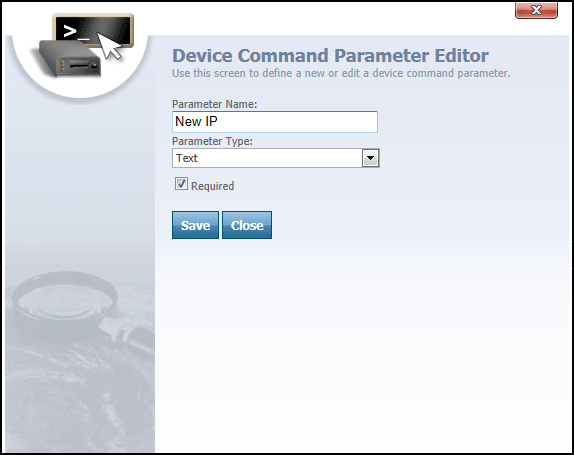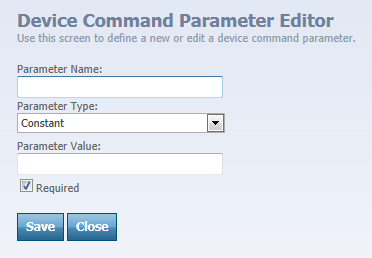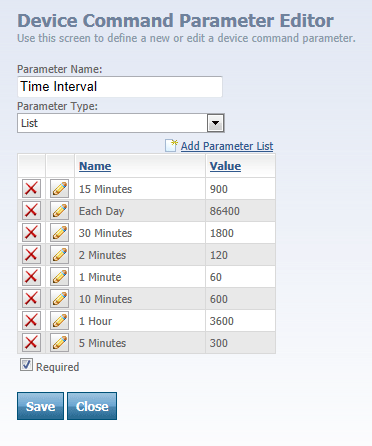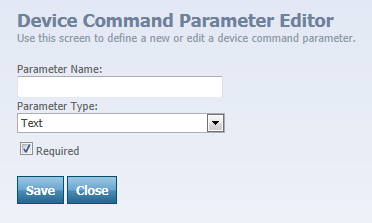

Device Command Editor dialog
TheDevice Command Parameter Editor is accessed from the Device Command Parameter List dialog by clicking either the  link above the parameter list, or by clicking the
link above the parameter list, or by clicking the ![]() icon next to an existing parameter. The Device Command Parameter Editor is used to add new parameters to a device command, or edit the configuration of an existing parameter.
icon next to an existing parameter. The Device Command Parameter Editor is used to add new parameters to a device command, or edit the configuration of an existing parameter.
The Device Command Parameter Editor features the following text fields and drop-down boxes:
- Parameter Name
- Parameter Type
- Required checkbox
Parameter Name text box is used to name the parameter. The name you enter is crucial, because in order for the parameter to be handled by your tracking device, the Device Listener needs to be coded to look for it by name. The parameter name will also appear on the Send Device Command dialog, which can be accessed from the Tracking screen.
Parameter Type drop-down box is used to select which type of parameter this should be. Currently there are three parameter types available:
- Constant: A fixed value, which is shown to the user but which is not editable.
- List: A closed-ended list of predetermined values, from which the user will be able to choose only one.
- Text: An open-ended text box into which the user can enter their own value.
For more information about how to configure each parameter type, please see below.
Required checkbox indicates whether or not this parameter is required to have a value when the command is sent. If this box is checked, the user will not be able to send the device command containing this parameter until they fill in a value for the parameter.
 button is clicked to either save a new device command or to save changes made to an existing one.
button is clicked to either save a new device command or to save changes made to an existing one.
 button is clicked to close the Device Command Parameter Editor.
button is clicked to close the Device Command Parameter Editor.

An example of the Constant parameter type
The Constant parameter type provides you with a single Parameter Value text box. Here, you would type the fixed value for the parameter that you always want to send to the device. The value will be visible to users when they send this command using the Map Suite GPS Tracking Server web portal, but they will not be able to edit the value.

An example of the List parameter type
The List parameter type gives you the ability to set up any number of Name/Value pairs that you want to offer as possible values for the parameter. When a user chooses to send this device command, they will be presented with a drop-down box containing all of the items in this list. Only the names will be displayed to the user; the value is what will be passed through to the tracking device when the command is sent. If the "Required" box is checked, the user will be forced to select an option from this list before the command can be sent.
To begin setting up a list, click the  link. A new dialog will appear, in which you will need to enter the Name and Value for this list item. When you are finished, click the
link. A new dialog will appear, in which you will need to enter the Name and Value for this list item. When you are finished, click the  button to add the list item.
button to add the list item.
Repeat the process until you have added all of the desired options to your list.

An example of the Text parameter type
The Text parameter indicates that you want to make a single text field available to the user, into which they can type in any value for the parameter that they want at the time the command is sent. If the "Required" box is checked, the user will be forced to enter some value in the text field before the command can be sent.
More: